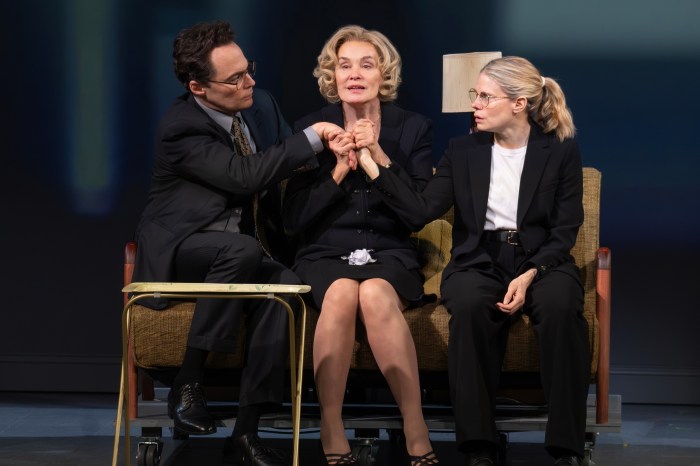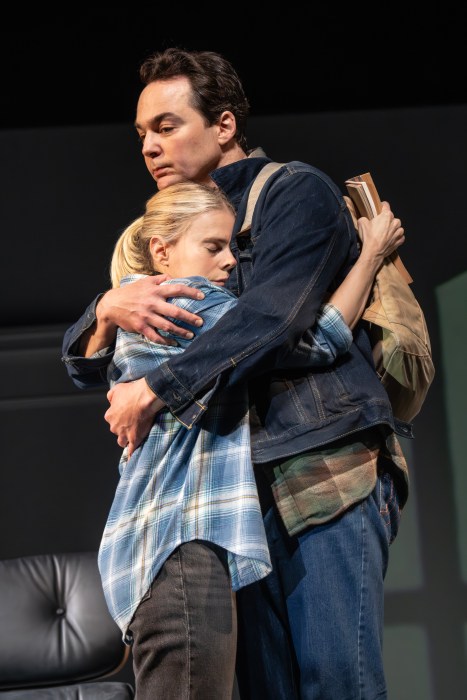‘Mother Play’ review: Unpacking the past with a meddling matriarch
Pulitzer Prize winner Paula Vogel (“How I Learned to Drive”) is most comfortable when writing about subjects that directly reflect her life. Early in her career, the out playwright stated that she sends a message to her brother Carl, who died of AIDS in 1988, “just a little something in the atmosphere of every play … Read More

Pulitzer Prize winner Paula Vogel (“How I Learned to Drive”) is most comfortable when writing about subjects that directly reflect her life. Early in her career, the out playwright stated that she sends a message to her brother Carl, who died of AIDS in 1988, “just a little something in the atmosphere of every play to try and change the homophobia in our world.”
In Vogel’s latest work “Mother Play: A Play in Five Evictions,” a three-hander now at Second Stage’s Hayes Theater, this message comes through loud and proud. In fact, a principal character in the play (also named Carl) is inspired by her gay brother. The titular mother, Phyllis, is based on her mother (also named Phyllis), and Martha, the bisexual younger sister, is essentially a stand-in for the playwright herself.
Under the dream-like direction of Tina Landau, the deeply affecting “Mother Play” is strikingly similar to an American classic featuring a forsaken, domineering mother and her two offspring struggling to break free. It is, of course, “The Glass Menagerie” by Tennessee Williams, a treasured author of Carl. Both are memory plays that open with a sibling narrating past events that led them to the present.

At the top of “Mother Play,” set in the present-day, a wistful Martha, in her early 50s, unpacks a medium-sized cardboard box filled with long-deceased Carl’s cherished belongings, including a letter dictating his burial service wishes. Later the content of the letter is voiced by Carl. The words are lifted verbatim, by the way, from the actual letter Carl wrote Paula shortly before he died.
The action cuts to 1964, as the family is moving into a dingy basement apartment on the outskirts of Washington, DC. Martha, aged 12, and Carl, 14, try to make the best of it. The careworn Phyllis is a heavy smoker with a taste for gin. The furniture is mid-century modern, although it’s the knockoff Scandinavian variety. The ever-shifting scenic design — they bounce around various abodes over the decades — is by David Zinn.
As with “Menagerie,” an acrid air of abandonment hangs heavy over the proceedings. The abusive father ran off with his mistress to a high rise in Georgetown, and cut off financial support. Vogel’s own parents, by the way, divorced when she was young, and she and Carl lived with their mother.

The cast is a closely meshed ensemble that delivers first-rate performances. Jessica Lange is nothing short of astonishing, imbuing Phyllis with a combustive mix of fervor and pathos. She constantly carps about perceived faults in her children: her daughter acts too mannish; her son dresses like a hippy and leads a “filthy lifestyle.”
“Was it too much to ask for one normal child?,” she snarls. Despite her perilous shortcomings as a mother, she earns our compassion, especially after revealing her husband’s misdeeds.
“I threw away my life when I married a goddamn pathological liar… spending his paycheck on his whores!” Phyllis laments. “And me walking around on fucking eggshells and at the slightest wrong word — wham! A broken nose! Slam! A black eye! And no one — no one stepping in to help me.”
The pitch-perfect Jim Parsons (“The Boys in The Band”) lends his customary snark to Carl who, after his mother bitterly rejects him for being gay, refuses to be ashamed of who he is. In her embodiment of Martha, Celia Keenan-Bolger deftly balances the sting felt from her mother’s disdain (Carl clearly was her favorite child) with the strength to come into her own power.
It should come as no surprise that Lange played the overbearing mother Amanda Wingfield in the 2006 Broadway revival of “Menagerie,” and Keenan-Bolger was Tony-nominated for her role as Laura in the 2014 revival.
The family’s struggle is compounded by being evicted from numerous apartments, in part because Phyllis complains of the vermin running rampant. These infestations are depicted by cartoonish projections (by Shawn Duan) of cockroaches skittering on the walls and kitchen cabinets. They are intended to bring comic relief but go too far.
They register as silly rather than scintillating, and are at odds with the otherwise serious dramatic tone.
“Mother Play” is greatly lifted by the music selections. The radio gets a rigorous workout, playing instrumental classics like “Moon River,” “Theme from A Summer Place,” and “Classical Gas.” As the timeline progresses, we hear “Baker Street,” “Disco Inferno,” and “I Will Survive.” The latter particularly stings, as it is clear that this iconic LGBTQ anthem does not hold true for all the members of this feisty yet beleaguered trio.
“Mother Play: A Play in Five Evictions” | Second Stage | Hayes Theater | 240 W. 44h St. | $99–$199 | Through June 16 | 2ST.com | 1 hr. 45 min., no intermission

 Mark
Mark 





